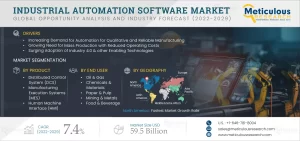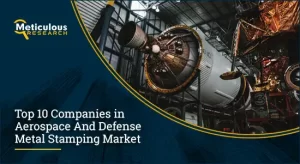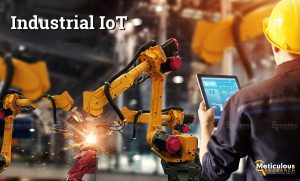The Industrial Automation Software Market is expected to reach a value of $59.5 billion by 2029, at a CAGR of 7.4% during the forecast period 2022–2029.
The industrial sector is undergoing a transformative shift, propelled by the integration of advanced technologies that redefine manufacturing and operational processes. Industrial automation software stands at the forefront of this revolution, enabling systems and devices to operate seamlessly without human intervention. This software harnesses the power of the Internet of Things (IoT), enhanced connectivity, sensors, and analytics to optimize industrial processes, transitioning from reactive to proactive maintenance strategies. The global market is witnessing significant growth, driven by the increasing demand for efficient, reliable, and cost-effective manufacturing solutions.
One of the critical factors propelling this growth is the dynamic needs of various industries that require complex operations and processes. As industries strive to enhance productivity and reduce operational risks, industrial automation software offers a viable solution by extending asset life and boosting productivity. The global market for industrial automation software is poised for substantial expansion, with projections estimating it will reach a value of $59.5 billion by 2029, growing at a Compound Annual Growth Rate (CAGR) of 7.4% during the forecast period of 2022–2029.

Download Sample Report Here – https://www.meticulousresearch.com/download-sample-report/cp_id=5279
Embracing Industry 4.0: A New Era of Manufacturing
The advent of Industry 4.0 has introduced a suite of technologies that are reshaping the manufacturing landscape. These include the Industrial Internet of Things (IIoT), cyber-physical systems, cloud robotics, cloud computing, and big data analytics. These technologies collectively enhance productivity, efficiency, knowledge sharing, collaborative working, flexibility, and agility, all while reducing production costs. Manufacturers of industrial automation systems are increasingly focusing on developing technologies compatible with Industry 4.0 to facilitate networked and intelligent production processes.
Industries such as automotive and transportation, metals and machinery, electrical and electronics, and aerospace and defense are at the forefront of implementing Industry 4.0 concepts. By integrating these advanced technologies into their manufacturing processes, they aim to harness benefits like increased productivity, improved flexibility and safety, higher product quality, reduced consumption of consumables, and lower production costs. This widespread adoption is a testament to the value these technologies bring to the industrial sector.
Government Initiatives and Global Investments
Recognizing the transformative potential of Industry 4.0 technologies, governments worldwide are introducing incentives to encourage their development and adoption. These incentives often come in the form of tax credits, reimbursements, and substantial investments in research and development hubs dedicated to emerging technologies.
For instance, the U.S. government allocated over $1 billion in September 2020 to establish 12 new research and development hubs focused on Artificial Intelligence (AI) and Quantum Information Science (QIS). Similarly, Singapore announced plans in February 2021 to invest $18.1 billion over the next three years to assist local businesses in innovating and building capabilities essential for the next phase of transformation, emphasizing the adoption of technologies like 5G, AI, and cybersecurity.
In India, the manufacturing sector invested approximately $6.5 billion in Industry 4.0 in 2021, reflecting a significant commitment to advancing industrial automation. These investments are not limited to government initiatives; private sector players are also making substantial contributions to promote Industry 4.0, thereby driving the growth of the industrial automation software market.
The Global Lighthouse Network: Pioneering Sustainable Manufacturing
The World Economic Forum’s Global Lighthouse Network serves as a shining example of how Industry 4.0 technologies can be leveraged for both operational excellence and environmental sustainability. In March 2022, the network expanded to include 13 new sites, bringing together a community of 103 world-leading manufacturing facilities and value chains. These facilities are utilizing Fourth Industrial Revolution technologies to enhance performance while promoting sustainable practices.
Notably, 66% of the lighthouse companies have made significant sustainability improvements. Companies like Janssen (Italy), Sanofi (France), BOE Technology Group (China), Schneider Electric (India), and Unilever (India) have reduced consumption, minimized resource waste, and cut carbon emissions, all while increasing productivity by 82%. These achievements underscore the potential of industrial automation software to drive both economic and environmental benefits.
Market Dynamics: Drivers and Opportunities
The surge in demand for automation aimed at achieving qualitative and reliable manufacturing processes is a primary driver of market growth. Industries are increasingly seeking solutions that enable mass production while reducing operational costs. Industrial automation software meets these needs by streamlining processes, enhancing precision, and minimizing human error.
The emergence of Industry 4.0 and enabling technologies such as IoT, AI, and big data analytics further accelerates this growth. These technologies facilitate the creation of smart factories where machines are interconnected, processes are optimized in real-time, and data-driven decisions enhance overall efficiency.
Moreover, emerging automation-driven industries in developing countries present significant growth opportunities. As these countries industrialize, there is a growing need for advanced manufacturing solutions that can meet increasing production demands while maintaining quality and efficiency. Industrial automation software providers are well-positioned to capitalize on these opportunities by offering tailored solutions that address the specific needs of these markets.
Get A Glimpse Inside: Request Sample Pages – https://www.meticulousresearch.com/request-sample-report/cp_id=5279
Key Technologies Shaping Industrial Automation
Several technologies are instrumental in advancing industrial automation:
- Industrial Internet of Things (IIoT): IIoT connects machines and devices in industrial settings, enabling real-time data collection and analysis. This connectivity allows for predictive maintenance, improved operational efficiency, and reduced downtime.
- Cyber-Physical Systems (CPS): CPS integrate computation with physical processes. Embedded computers monitor and control physical processes with feedback loops, enabling systems to respond to changes in real-time.
- Cloud Computing and Robotics: Cloud technologies provide scalable resources for data storage and processing, while cloud robotics allows robots to leverage cloud-based resources for enhanced capabilities.
- Artificial Intelligence and Machine Learning: AI and machine learning algorithms enable systems to learn from data, improve over time, and make intelligent decisions without explicit programming.
- Big Data Analytics: The vast amounts of data generated by industrial processes are analyzed to uncover patterns, optimize operations, and drive strategic decisions.
Adoption Across Industries: A Multifaceted Impact
The impact of industrial automation software spans multiple industries:
- Automotive and Transportation: Automation enhances assembly line efficiency, improves quality control, and reduces production times.
- Metals and Machinery: Automated processes increase precision in metal fabrication and machinery production, leading to higher quality products.
- Electrical and Electronics: Automation in electronics manufacturing ensures consistent quality and allows for rapid scaling of production to meet market demands.
- Aerospace and Defense: High precision and reliability are critical, and automation helps meet these stringent requirements while maintaining safety standards.
These industries are leveraging industrial automation software to stay competitive, meet regulatory requirements, and satisfy customer expectations for quality and innovation.
Benefits of Industrial Automation Software
The adoption of industrial automation software offers numerous benefits:
- Increased Productivity: Automation accelerates production processes, allowing for higher output without compromising quality.
- Enhanced Flexibility and Agility: Automated systems can be quickly reprogrammed to accommodate new products or changes in production schedules.
- Improved Safety: By reducing the need for human intervention in hazardous environments, automation enhances worker safety.
- Higher Product Quality: Automation ensures consistency and precision, reducing defects and improving overall product quality.
- Reduced Operational Costs: Automation minimizes labor costs, reduces waste, and optimizes resource utilization, leading to significant cost savings.
Challenges and the Path Forward
Despite the numerous benefits, the implementation of industrial automation software is not without challenges. These include:
- High Initial Investment: The cost of acquiring and integrating new technologies can be substantial, posing a barrier for some organizations.
- Skill Gap: There is a growing need for skilled professionals who can manage and maintain advanced automated systems.
- Cybersecurity Risks: Increased connectivity raises concerns about data security and the potential for cyber-attacks on critical industrial systems.
Addressing these challenges requires a concerted effort from industry players, governments, and educational institutions to invest in training, develop affordable solutions, and establish robust security protocols.
Exploring Further: Access the Full Report
To delve deeper into the trends, technologies, and market projections of the industrial automation software landscape, access our comprehensive report. This detailed analysis provides valuable insights into the factors driving market growth, challenges faced by the industry, and opportunities for stakeholders.
Immediate Delivery Available | BUY THIS RESEARCH REPORT (Insights, Charts, Tables, Figures and More) – https://www.meticulousresearch.com/Checkout/64951317
Scope of the Report
Industrial Automation Software Market, by Product
- Supervisory Control and Data Acquisition (SCADA)
- Distributed Control System (DCS)
- Manufacturing Execution Systems (MES)
- Human Machine Interface (HMI)
- Programmable Logic Controller (PLC)
- IT and Software Environment Integration Solutions
- Production Process Test Systems
- Automated Material Handling Systems
- Coordinated Data Management Systems
- Automatic Storage and Retrieval Systems
Industrial Automation Software Market, by Deployment Type
- On-premise
- Cloud-based
Industrial Automation Software Market, by End User
- Oil & Gas
- Chemicals & Materials
- Paper & Pulp
- Pharmaceuticals & Biotech
- Mining & Metals
- Food & Beverage
- Power
- Consumer Goods
- Automotive
- Machines & Tools
- Semiconductors & Electronics
- Aerospace & Defense
- Other End Users
Contact:
Meticulous Market Research Pvt. Ltd.
1267 Willis St, Ste 200 Redding,California, 96001, U.S.
USA: +1-646-781-8004
Europe: +44-203-868-8738
APAC: +91 744-7780008
Email– sales@meticulousresearch.com
Visit Our Website: https://www.meticulousresearch.com/
Connect with us on LinkedIn- https://www.linkedin.com/company/meticulous-research






